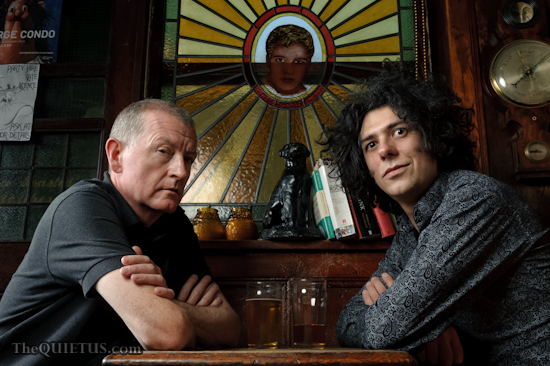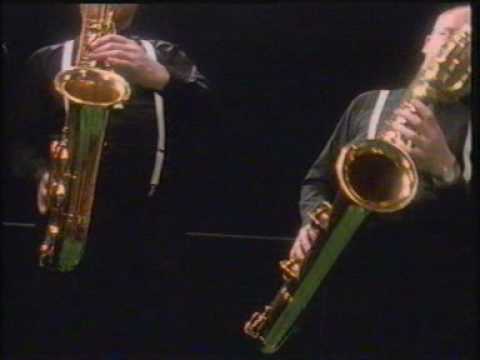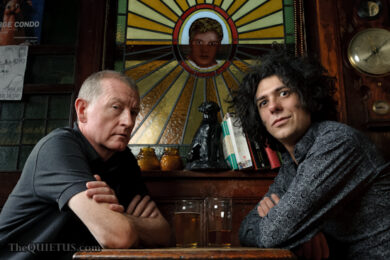Photographs courtesy of the suave Mr Al Overdrive
Thanks to Ben and the regulars at the best pub in King’s Cross, The King Charles I, for letting us take over for an afternoon
It takes a short while to get used to snooker champion Steve Davis in person, as he has a sense of humour drier than Lynchburg, Tennessee during a heat wave. On the afternoon of our lunch with the snooker champion and guitarist Kavus Torabi, we take a people carrier to the pub and the driver takes a wrong turning somewhere near King’s Cross. We trundle to a halt at the end of a street blocked off with bollards. Davis is as implacable as a Cyberman when he nods at the two-foot gap between the bollards and says: “You’ll get her through there no problem.” The driver looks worried and stammers: “I’m not sure I can do it.” Davis weighs up the situation for a moment and says: “Nah, you’ll glide through there, don’t worry about it.” The driver starts to look panic stricken: “I really don’t think there’s enough room.” Eventually the player, who was nicknamed the Ginger Magician after winning more professional titles than anyone else in his field, has to gently explain that he is joking. There is an audible whistle of relief as the taxi starts reversing up the road.
It is perhaps this easy-to-misinterpret veneer of faux seriousness that led to another of his nicknames: “Interesting”. But despite gamely playing up to the perception of him being slightly boring, he has passions that could reasonably be described as esoteric. Outside of snooker his biggest cultural love is the progressive, experimental, leftfield music of the French band Magma. The group, who formed around virtuoso drummer Christian Vander, produce music that combines strands of prog, 20th-century classical and jazz. The band’s lyrics are delivered in the made up language of Kobaïan, often in ear-piercing shrieks and screams. Davis is not alone in his love – Magma can also claim John Lydon and Zach Hill of Hella and Death Grips as fans. But it was Davis who funded a series of concerts for the band out of his own pocket.
His love for Magma is just one facet of an a greater obsession with music in general. In record collecting circles Davis is renowned as a knowledgeable head when it comes to the Canterbury scene, progressive rock and soul music too.
With this in mind, it’s easier to understand the friendship between him and Kavus Torabi, a hugely inventive guitar player who fronts the avant-pop band Knifeworld and also appears in the Magma-esque Guapo. Torabi, a former member of the Cardiacs, Monsoon Bassoon and Chrome Hoof, is every inch the rock star, with wild hair and piercing eyes, but the pair have been pals since hitting it off at a Magma gig in France seven years ago.
Their relationship was a meeting of minds, with Torabi introducing ‘Romford Slim’ (yet another nickname) to a host of new bands and then becoming a regular co-presenter on Davis’ weekly programme on Essex station Phoenix FM, called The Interesting Alternative Show.
While Davis is at the bar, Torabi explains that the snooker player is very open minded about all music, not just the stuff of the early 1970s. “He phoned me up recently, ‘Kavus, who was that rock band you played on the show? Sonic Youth? I love them now. Can’t get enough of them.’” It transpires that Davis’ extra-curricular activities reach beyond music; he’s a keen poker player and is writing a book on the subject. When we tell him that Shellac frontman and engineer par excellence Steve Albini is a fiend at Texas Hold’em, he wastes no time in throwing down the gauntlet: “Tell him I’ll play him. You could run a Quietus poker game where we all gamble on one of our favourite pieces of vinyl. They’d have to be really rare records to make it worth it. Yeah, I’ll play him.”
What a superb idea. Albini – the ball’s in your court.
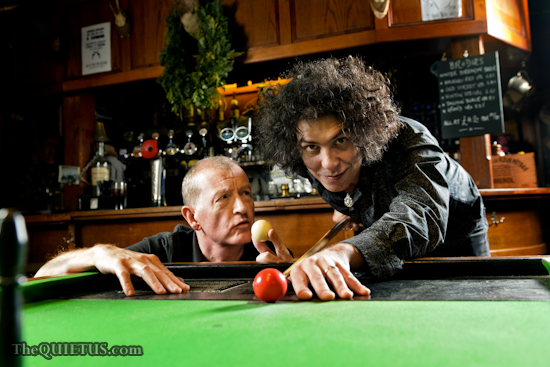
What was the record or group that really switched you on to underground music that acted as a gateway drug into a whole new world?
Steve Davis: Well, for me the group was Magma. This was at a time when everyone was listening to Steve Harley and Cockney Rebel, Roxy Music and the more progressive people were listening to Genesis and Yes but the band that I really loved was Magma. When I went to see them live I was really blown away. They were so different to what was going on at the time and this was my head banging stuff. I saw them at Chalk Farm Roundhouse live and it changed my musical direction really.
Which album did you hear first by them?
SD: The first album I heard by them was MDK which was their third album. Not long after that, they had a single out on A&M, which wasn’t a hit funnily enough. It was called ‘Mechanic Machine’ and it was an absolutely nutty piece of music with a massive bass line and shrieking and screaming on it. It was so unfashionable at the time. It was amazing how A&M trusted them enough to let them put two albums out. It was down to a guy called Giorgio Gomelsky who was a pretty decent A&R man. After that there was no going back and I became a big fan.
The visionary major label A&R is the person who has been squeezed out of the picture now by and large. You just don’t get people like Uwe Nettelbeck who managed to persuade Polydor that they had the next Beatles when they signed Faust. What about you Kavus?
Kavus Torabi: For me it was the really obvious choice – Trout Mask Replica. I’d never heard harmony and polyrhythms done like that. I guess I was already into crazy stuff through the Cardiacs but hearing Trout Mask Replica was the one. I had no idea that music could be like that. It still gives. I still listen to it now. You can still occasionally hear the odd band nowadays like Deerhoof or US Maple from a few years back who are influenced by it. But had that album had its way, things could be very different. It still empties parties. It still baffles people. This record has an occult power.
SD: But what about from your era though? That was from before your time.
KT: From my era… the big one was Torture Garden by Naked City which got me into Fred Frith and then Henry Cow became one of my favourite bands. And from there I got into John Zorn. Basically because of Torture Garden I got into jazz. I didn’t have jazz ears before that.
SD: I can’t imagine what jazz ears would look like.
Feature continues after photograph
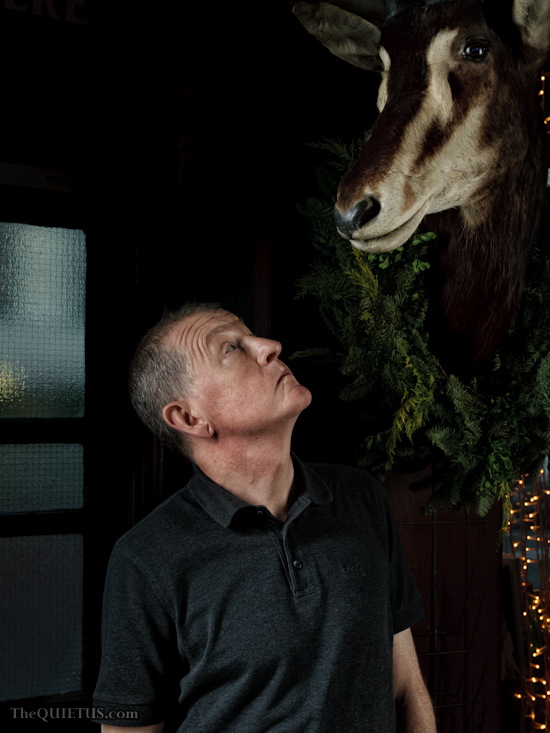
If you were explaining to a novice about Magma, how would you describe them as compared to other prog bands? What was their thing?
SD: To a lot of people who are fans, it’s the heavy bass lines and the image of them on stage. But for me it was the vocals. They’re not just an instrumental band even though a lot of people like that aspect. There is one particular track called ‘De Futura’ which people in the crowd at a gig will start banging their heads to but that is perhaps my least favourite track. I prefer some of their lighter ones. I don’t really know what style of music you would call it. I don’t know if I would call it prog even.
KT: I’m very ambivalent about the term prog in general because it has so many negative associations. But for me the thing about Magma is that I really like music that has a lot of tunes and different lines playing at the same time and Magma really do that up the ass. You get a song by them and the drums will be doing something the bass will be doing another thing, one half of the vocals will be doing something else with the other half somewhere else and then the guitars playing in a different cycle over the top of that. And it just gets more and more out there as they repeat it over and over again.
SD: For me it’s the perfect mix of rock, jazz and classical. Normally people would automatically go well that’s a load of rubbish to mix those genres up but they just do it so well.
KT: Their music makes me want to believe in God. There are moments when you listen to them – particularly live – when you think, ‘Yeah… maybe there is someone up there!’ Maybe part of it is the ritualistic chanting thing, when it goes into more and more layers.
SD: They are very Marmite. [starts laughing] You will either go, ‘No!’ or you give it a chance. And in that respect they are very similar to another couple of bands who are linked to them called Art Zoyd and Univers Zero. And you either go, ‘Yeah, I get it’ or ‘I’m never going to listen to this again.’
Did the epiphany from the records spill over into the live arena?
SD: No. When I first heard the records I thought they were a load of crap. But when I went to see Isotope, a Canterbury band who were supporting Magma that night at the Roundhouse. I was about to go home after watching Isotope but I stayed to watch a bit and became an instant fan. Maybe with a lot of bands you need to see them live. Another band that I was like that with was a band that you were working with for the Tim Smith benefit called the Wizards of Twiddly. I heard them and thought, ‘Nah.’ But then I saw them live and now I’m a fan.
KT: It’s odd how you can get into Magma. My wife is a Magma nut now and she had an almost religious conversion. It happened at the Queen Elizabeth Hall on the South Bank on this really biblical night with lashing rain and howling winds. I said, ‘Look just check this out.’ And within five or ten minutes she was hooked and we’ve seen them twenty or thirty times since. I saw you there that night actually but it was before I met you.
SD: I was there. So were Paul McCartney and Heather Mills!
Steve, can you tell me a little bit more about how you became involved with the band? Because I know it feels good if you can help out a band you like a little bit but you went way beyond that didn’t you?
SD: Yes, I guess I had enough disposable income at the time to think that I could probably afford to bring them back to England for a gig. I was in Virgin Megastore on Tottenham Court Road [in the mid-80s] and when I was flicking through the records I saw Christian Vander’s name and thought, ‘Oh, I didn’t know they were still making records.’ I guess I’d lost touch with them a bit. So I bought it, went home and listened to it and thought, ‘This is fantastic.’ I phoned the number off the back of the sleeve and said, ‘Do you want to come to London and play.’ And they agreed. Little did I know there were 14 people in the band plus road crew so I done my brains in. But it was great. They did three nights at the Bloomsbury Theatre and it was fascinating to see the people who came through the door each night. Every night was sold out. The first person walked in with his original Afghan on from the 70s and the next person in had a three piece suit, with a bowler hat and a briefcase. It was all these people who had come out of the woodwork to watch a band they remembered, so that was worth it for me. Why did I do it? I don’t know. It just seemed like a good idea. I don’t know why I didn’t just get on a plane and go and watch them in France. There was no great plan.
Do you keep in touch with them?
SD: Yeah, I still go and watch them all the time. That’s how Kavus and I know each other. We were both over in France watching Magma and you know how it is, you hear a familiar accent so we started chatting. And then after we were speaking for a while, he said, ‘I’m in a band.’ And I thought, ‘Ah. How lovely. Isn’t that nice that he’s in a little band?’
KT: [laughing]
SD: I thought well, if he’s into Magma maybe he’s in some weird pub band. He said come and watch us live so I said yes. Now I didn’t know the Astoria so I had no idea how big it was. So I walked in there and there was 1,500 – 2,000 screaming Cardiacs fans giving it all this hands and eyes stuff and all of sudden my new mate comes out on stage and everyone’s like this [mimes worshipping]. So I was saying to people, ‘See him up there… he’s my mate!” And through Kavus, I’ve had my ears opened to a whole new lot of music. So we know each other through Magma really.
Feature continues after photograph
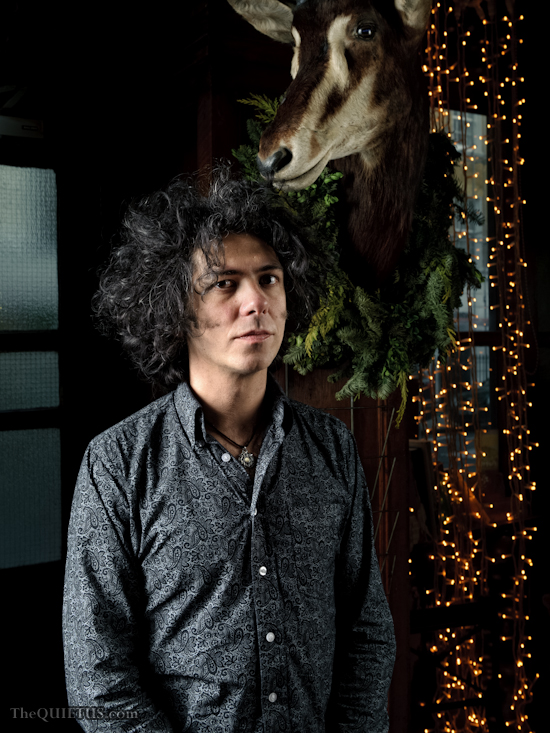
Where do you see Magma’s influence on music over the last ten or twenty years?
KT: Well, it’s all there. One of the bands I play in Guapo is obviously quite influenced by them. There’s a whole scene going on in Europe linked to this. It wouldn’t be true to say that we’re the only band in the UK doing this kind of music but there are loads and loads of them in Europe. There are festivals that are held around this kind of music, around – and I hate putting things into genres but for want of a better term – avant rock music. I don’t like the AR word, I don’t like the P word.
I know a lot of the people who work at Prog Magazine and while I like it, I’m always quite surprized by a lot of the bands I see in there, so obviously the word prog means different things to different people. What are your problems with the word?
KT: Well, there are two problems with it. One, does progressive rock refer to a specific period of rock music that happened between 1971 and 1974 or does it mean a state of mind? I think prog the four letter word, as it is seen today, was invented by the ageing punks who used to police the music scene when I was growing up in the 1980s. It was a dirty word and it was used to label anything that had more than four beats in the bar or more than five or six chords. So it was used in a very negative way and it’s something that has always been thrown at me since I was making music from the age of 16. Really it’s a way of attacking something that’s got high-falutin’ ideas or something that’s got extended instrumental sections.
SD: I’ve got to say I think it’s fantastic that you can get a magazine about prog in high street shops in the UK, so from that point of view it’s marvellous. It’s hard to suss out what people are listening to nowadays so other things get bundled in with it. Like with the show we do… when people say, ‘What kind of radio programme is it?’ The temptation is to say prog because at least then people might listen in a way they may not if you said, ‘We play leftfield music.’ People may say, ‘Ah, I like prog!’ They know what it is.
KT: It is true that nowadays prog seems like less of a dirty word, so maybe that’s it. Maybe it’s time to reclaim the word prog like gay people did with the word queer and stop it from being an insult. I’ve spent so long saying, ‘I’m not prog! I’m not prog! I play psychedelic music!’ Maybe it’s time for me to embrace the word prog.
Proggers With Attitude.
KT: I’ve always called it psychedelic music. I like all the associations of the word and I like the fact that it’s very exploratory music and multi-layered. And I think of a lot of the albums that come under the prog banner in these terms. I think of Close To The Edge by Yes as a psychedelic album. I think of Cardiacs as a psychedelic band and Magma as a psychedelic band. I tend to think of bands that I don’t like, such as ELP or Dream Theater as prog, virtuoso but with no tunes.
SD: Well, some people like those bands so it’s good for them that they’re catered for and there’s a chance that they’ll get sucked into listening to some other bands along the way, so that’s got to be a good thing. I think not knowing that things exist is the worst crime of all. So on the back of that magazine, there have been a number of features on bands that are pretty far out.
KT: They’ve been incredibly supportive of what I do.
I don’t think they can effectively call it Psychedelic, Space Rock, Jazz Rock, Fusion And Progressive Monthly, because it won’t fit on the cover and leave you room for a photograph of Peter Gabriel with a plant pot on his head.
KT: Maybe that’s it. It’s a categorization thing. They’ve been really nice to me. They did a two page feature on my group [Knifeworld] which I couldn’t believe it when we got it. The people there like Jerry [Ewing] and Dom [Lawson] are lovely.

I guess people who only know you for the day job might be surprised by all this Steve. While your sport has certainly got its share of wild men and erratic behaviour, it’s still seen as a very straight-laced, conservative with a small c, kind of game. What do people in the snooker world make of your taste in music?
SD: I did advertise that the radio show on twitter a couple of weeks ago. And a lot of the snooker players do follow each other on twitter and after half an hour of the show, Shaun Murphy tweeted back saying, ‘My ears are hurting.’
KT: [laughing]
SD: I had a trapped audience once because I was on an aeroplane with Terry Griffiths and I played him a piece by Christian Vander and he quite liked it.
What is he normally into?
SD: You know, I don’t have a clue. It’s not something the players sit round and discuss for some reason. We live in this sad world now where you have to walk out to a piece of music and you’re allowed to pick your own piece of music. It’s a bit like the wrestling but there’s less dry ice. So I decided to pick one of Art Zoyd’s Dracula inspired pieces… it didn’t really go down that well with the crowd. Most of them would prefer something a bit more happy. Neil Robertson was walking out to ‘Down Under’ by Men At Work. John Higgins was walking down the steps to ‘(I’m Gonna Be) 500 Miles’ by The Proclaimers. Interestingly, they wouldn’t let Steven Hendry have his. He wanted The Smiths’ ‘Heaven Knows I’m Miserable Now’ because we all like to play up to our images a little bit. But I don’t really know what the other players think. I think maybe they think I’m a bit eccentric but I don’t think they really listen to the music.
Imagine it’s the World Snooker Tournament 2013 and you’re up against some new player who is a completely unknown quantity and he walks out to [notoriously difficult kosmische album] Cottonwoodhill by Brainticket…
SD: Then I’d be like: [makes worshipping gestures]
Tell me about the radio show.
SD: Initially on Phoenix FM we were a community radio station that was working one month out of every six because that was the only type of license that we could get but then the government opened it up a bit. At one stage I was doing an occasional soul show and the guy who ran the station said do you want a regular slot. I didn’t want to do more soul though, I was starting to get back into the stuff I liked as a kid. I said that I’d much prefer to do an alternative show but that no one would listen so could I have Monday night, ten ‘til twelve. That would mean that by the end of my show no one would be listening so we could just turn on the tape and leave it playing music through the night. But it’s got half of a cult following now, it’s really funny.
KT: We get people from all over the world listening.
Where do you find out about new music?
KT: I get some of my recommendations from you. Your end of year list was really good. I’ve got about four or five mates who turn me on to new stuff. You know Max Tundra don’t you? He’s always coming up with great stuff for me to listen to.
SD: The show has a really good balance of stuff on it. When I first started the show, I was at this music festival in France and I met Charles Hayward [Quiet Sun, This Heat, Camberwell Now] and I asked him if he would do the show. And it was a nice thing because very few people get the chance to go on the airwaves and play their favourite music. Then I had Kavus on the show. Now, bearing in mind it’s only a two hour programme he turned up with 70 CDs…
KT: I didn’t have a clue.
SD: I think everyone’s got a DJ inside them who loves turning people onto new music. Every time you introduce someone to a new piece of music that they didn’t know about before you feel quite nice inside. But getting back to the point, I do feel we’ve got a small responsibility to find new music and if we can introduce people to it, even if it’s only one person who goes, ‘I’m going to buy that’, then that’s a nice feeling.
People use the insult hipster these days when they don’t actually understand what they’re saying. What they actually mean is, I don’t like you because you’re wearing tight jeans, you’ve got a moustache and stupid glasses and you look like you’re having a good time. A hipster on the other hand is basically someone who knows a lot more than you do and they kick your arse… they shame you into learning more about something. It can be elitist and vaguely unpleasant in some ways but if that’s the way I get to hear ‘Simple Headphone Mind’ by Nurse With Wound and Stereolab and today Magma, then so be it.
KT: So we’re reclaiming the word hipster from the Dalstonian ironicists and we’ve reclaimed prog?
A few more and our work on this planet will be done. Kavus, you said that you think in terms of psychedelic music not prog. What does psychedelic mean to you?
KT: I think good psychedelic music can make you feel like you’re on drugs when you’re not. I think that bad psychedelic music sounds like it was made by people on drugs. That’s the essential difference. That’s always been the benchmark for me, whether it was made by My Bloody Valentine or Syd Barrett.
SD: I’m not sure I can even comment because if you look at the music I listen to, then I’m not sure if I’ve even listened to that much of it. I’m not unsympathetic to it I just don’t really know it. The only thing that I’ve listened to that I would consider to be psychedelic would be Gong. Well, the Beatles as well but then I guess everyone’s listened to them.
Feature continues after photograph
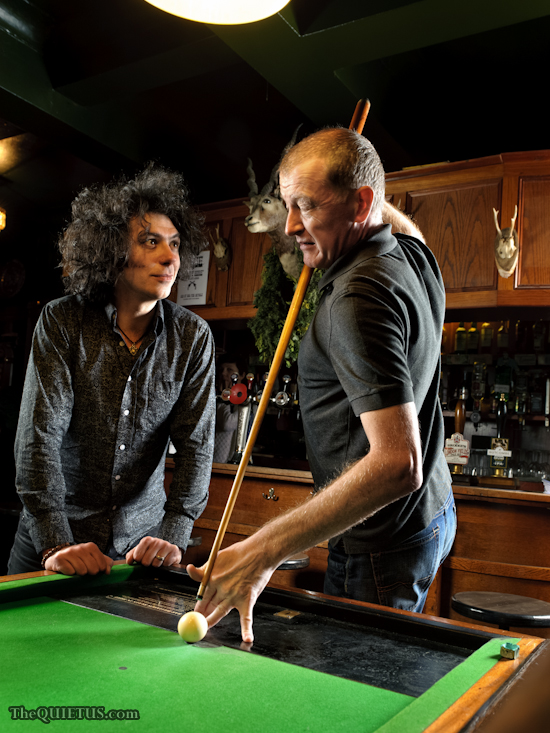
[The party retires to the King Charles I pub and light ales are ordered]
SD: Your hair is looking good Kavus.
KT: Thanks I had time to blow dry it. I have to blow dry it or it goes crazy. You must use a hair dryer John.
I used to blow dry my hair, because then it would look magnificent but then one day it got trapped in the hair dryer and blew it up. So now I just let it drip dry and it takes hours. I condition once a week though. Otherwise my hair goes into dreadlocks. And I don’t want people to think I’m some kind of . . . cave man. Some stripy trousered unicyclist who juggles for food.
KT: I had dreadlocks about 20 years ago. Grim times. It was a bad era. I moved to London and cut them off because it was like walking round with a blanket on my head all the time.
SD: I don’t want to boast…
KT: But you had really good dreads?
SD: …but during the 1980s, I won haircut of the year.
KT: Who was the judge?
SD: The entire hairdressing industry. They were the judges. At the time I had ginger hair with a parting with just a little bit of dandruff. But I think the aim was to promote the hair dressing industry. Selina Scott the newsreader won in the female category. We had our photos taken together and then got interviewed. They asked her how much she spent a year on her hair and she refused to tell. They asked me and I said 50 quid. And apparently it was the first time someone ginger had won it.
KT: I don’t think of you as a ginger.
SD: I know, I know, I know. But I am.
Tell me about playing live for the Cardiacs… They used to have pretty special gigs didn’t they?
KT: They would have beautiful gigs really and I was part of the whole operation for ten years before I even joined the band, I was guitar tech-ing. It was very incestuous . . . I think it was very similar to the Canterbury scene of the late 60s and early 70s in that there weren’t that many people but everyone had slept with each other and been in bands with each other and it was kind of like that with the Cardiacs. So my old band Monsoon Bassoon had been produced by Tim [Smith] and we had toured with the Cardiacs. The fans really, really love the band and they tend to really love music. The Cardiacs isn’t a cool thing, they’ve never been cool and I’m not bothered by that. It’s a devotional audience with a lot of love. Like with any extreme band a lot of the audience are pretty nutty – usually in a good way but occasionally in darker way.
SD: Yeah, I only saw them twice and I guess that’s it now. I was quite bewildered when I saw my new mate on stage kissing Tim Smith. I wondered what sort of world I was being lured into. But I know it’s a performance…
KT: No! I think a lot of bands would be much better if the two guitarists kissed each other on stage. Judas Priest for example. Well, maybe not Judas Priest.
Slayer!
KT: Oh my God! That would be a wonderful thing! As long as Iron Maiden don’t do it. Ugly scenes.
SD: Now no one would complain if certain girl groups were to do it.
Or snooker players. After a particularly fraught frame it might relieve the tension.
KT: Yeah, a little kiss or a little cuddle. You see, we’re already engineering a more beautiful world.
SD: How about getting the referee involved? He may feel left out.
So over the years you’ve been involved in a lot of bands such as Monsoon Bassoon, Cardiacs, Guapo, Chrome Hoof and now you’re in Knifeworld. How do they fit into the picture?
KT: Well, I don’t know if they fit in or not. They started as a solo project but now it’s a band and I guess I see them as sitting uncomfortably somewhere between Henry Cow and XTC. I love pop music and I love making really complex, noisy music. Does it fit in? God, I don’t know John! You’re the music writer! You tell me!
SD: I can’t really talk . . . well, actually I can because my record sold a lot more than Kavus’.
KT: You got on Top Of The Pops.
SD: Snooker Loopy got to number seven in the charts and if it wasn’t for The Chicken Song we would have got a lot higher.
What exactly did Spitting Image have against you?
SD: No, not at all because I was actually in the chorus of the Chicken Song.
KT: You were in the charts twice at the same time?
SD: So I know what it’s like to have the pressure on you as we had to follow up the success of ‘Snooker Loopy’. We thought we’d cracked it. So then Chas and Dave followed up ‘Snooker Loopy’ with ‘The Romford Rap’. I’m sure the YouTube of this is out there somewhere [Here it is – Ed]. So we thought it was going to be the LP, the tour and everything. But it peaked at 102 in the charts and that was the end of it really. We did videos for both of them and that’s where all the money went.
You enjoyed the It Bites model of fame.
SD: We came out of the Hippodrome all seven of us, dressed in different colours, representing a ball each. ‘The Romford Rap’ was basically about the cockney rhyming slang for the different colours of the balls. So someone had to dress entirely in yellow and so on. I pulled rank and got the black suit. So we had to preview the song live at the Hippodrome to a crowd of people there on a Monday night. I don’t know what sort of night it was but Willie Thorne who was wearing a pink suit got propositioned in the gents later on. And that was my brief taste of fame over.
Catch Steve and Kavus on the Interesting Alternative Show On Phoenix FM tonight

